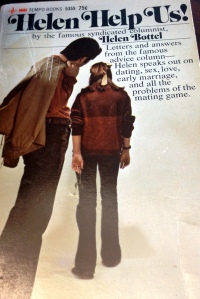“Don’t show up looking like a beatnik!”–Gay Head
That Freshman Feeling by Judith Unger Scott, 1960
Hi There, High School by Gay Head, 1953 (1972 printing)
About These Books: In honor of back-to-school season, I present these two books about fitting in and standing out as a new high school freshman. Each book’s cover artwork accurately represents the tone its author takes toward readers.
Scott’s book, published for the library market, provides sensible advice about career planning, study habits, and friendship.
The Head tome, a Scholastic Book Club selection, doesn’t trust its readers to walk down the hall properly or to eat ice cream without plunging into the dish head-first.
Guess which book we’ll be concentrating on today?
(Adding to the Head book’s weirdness is its editors’ failure to update it after 20 years. I wonder what 1970s teens made of its references to jalopies, Nat King Cole, fountain pens, dance bands, and Bob Hope.)
Bad Examples
To show us what not to do in any situation, Head invents a gaggle of social misfits.
Consider, for example, the way these “traffigoons” handle something as simple as walking down the hall:
- Breezy Jones “doesn’t mind bumping into people. He’s big and tough, and he acts as if it’s the Other Person’s fault for getting in the way.”
- Buzz Newton “weaves in and out of traffic, whoo-whooing like a train whistle.”
- Jessie James elbows people and bangs doors in their faces. “Bang-Bang Jessie. Still playing Wild West, when the rest have put away their pistols.”
- Gertrude Gates “keeps everybody guessing, herself included,” by making sudden stops.
What’s in Jessie James’ messy locker? “Two library books; six textbooks containing notes, pictures, and papers; three ancient and tattered copies of the school paper; two fountain pen tops, no bottoms; one bottle of ink, no stopper; a stack of notebook paper splotched with ink; two and one half pencils; an old notebook cover; a battered violin case containing a wadded-up sweater and a worn-out gym shoe; a couple of smashed ping-pong balls; one glove; a cracked bottle of nail polish; a comb with three teeth in it; four dirty handkerchiefs; a stale sandwich and a banana peeling from yesterday’s lunch.” Except for the fountain pens, ink, and handkerchiefs, this sounds a lot like my car.
Questions that Head suggests students ask about their new school: “Must you have a school permit to park your bike or jalopy in the school parking lots? Is it all right for boys to wear jeans or dungarees? Shirts without neckties? May girls come to school with their hair in curlers?”
Fashion Tips
“A boy’s pressed suit and clean shirt, with harmonizing tie and socks, will fetch up more favorable comments than the latest craze in wild combinations.”
“One suit—plus changes of sweaters and shirts—equals many costumes. One dress with different accessories (collar, scarf, belt, or jewelry) can double for school and dates. Team up your wardrobe so that it works as smoothly as a well-trained backfield. You’re calling signals!”
More Wisdom from Hi There, High School
“The sophomore wags who try to sell you locker tickets, elevator permits, and season passes to the swimming pool are not to be trusted. But if you fall for one of their gags, take it with a grin. Your fun will come next year!”
“You’ll really be in the swing of things at Central High this year if you start by learning all you can about your school.” She recommends boning up on school history and tradition. That stuff actually interested me when I was in high school, but somehow my knowledge didn’t catapult me into popularity.
“Don’t make the cafeteria a circus ring for showing off some prize pig tricks!” Are there prize pigs in the circus? Sounds more like the county fair.
“Eat ice cream a spoonful at a time. Licking and lapping are kittenish tricks.”
On dance conversation: “If you converse, talk about the music and your favorite dance bands or vocalists, or ask your partner a leading question about his favorite sports, entertainment, or hobbies. This is neither the time nor place to display your knowledge of atomic energy, guided missiles, or supersonic speed.”
“Constipation, unless due to organic causes, can be controlled by proper diet. Don’t get the pill habit!
“Don’t wear your feelings on the outside. If they stick out like a porcupine’s needles, they’re going to bump into plenty of trouble.”
“A shrill voice grates on the ears. A squeaky voice makes everything you say sound silly. A guttural voice creates the impression of harshness. A whiny voice sounds ill-humored. A booming voice alienates listeners. A monotone puts them to sleep.” Sheesh–you can’t win here.
“Are you a Mumbler, a Word-Swallower, a Word-Mixer? You may be as wise as Einstein or as “wisecrack” as Bob Hope, but people won’t listen to your witticisms unless they can understand what you say.”
“Imagine that it’s New Year’s Eve in the year 1999! In a few minutes, the bells will ring and the year 2000 A.D. will be ushered in. That will be a big event in your lives, for most of you will be alive to celebrate the beginning of the new century. You’ll be the parents or grandparents, then, shocked (no doubt!) about the ‘wild ways’ of teen-agers. You’ll be running the factories, the stores, and the offices. Some of you will be mayors, governors, and senators. One of you may be the President!”
Wisdom from That Freshman Feeling
“If your friendliness and good manners extend only to a small, accepted social group, you’re a snob! ‘Wait a minute,’ you may say, ‘am I supposed to make friends with a collection of all the odd characters?’ No, of course not. But you shouldn’t ignore or reject them.”
“Delicious stuff to eat makes any party a howling success.”
“Every few years a new fad hits the high school. For no reason at all—it seems to come out of the atmosphere—the boys develop a passion for red sweaters or the girls wear green nail polish. Next year it may be crazy haircuts or dinky hats.” Dinky hats seem to be berets. See, for instance, this wonderful headline from 1931–“Gay berets sit atop male heads: Dinky hats in wild colors rage at Palm Beach.”
“In some families, a telephone timing system is worked out and it can be very successful for young people and grownups alike. A ten-minute timer is purchased and set at the beginning of every telephone conversation. When it goes off, the talk is terminated and the party cannot be re-called for at least a half hour.”
“Some girls whose goal is to be a wife and mother use these inherent talents in their job selection. They prepare themselves for a job that will make them more efficient in homemaking. For instance, the girl who has the money and ability to go on to college may study to be a home economist, or she may enter a hospital for nurse’s training.”
About the Authors: The semi-mythical Gay Head is an old friend of this blog. Scott was one of many writers who specialized in advice books for teenagers. Hers have especially nice titles, including Lessons in Loveliness, Pattern for Personality, The Art of Being a Girl, and The Bride Looks Ahead. According to her dust jacket bio, she also hosted a radio show for teenagers and “conducted classes in personality, beauty, and manners.” She once worked for Ladies Home Journal, a launching pad for many of our Weird Words of Wisdom authors. Scott died in 2001.
Other Weird Words of Wisdom posts you might enjoy:
Speak Softly and Carry a Hot Breakfast Edition



















 In My Opinion: The Seventeen Book of Very Important Persons, 1966
In My Opinion: The Seventeen Book of Very Important Persons, 1966



